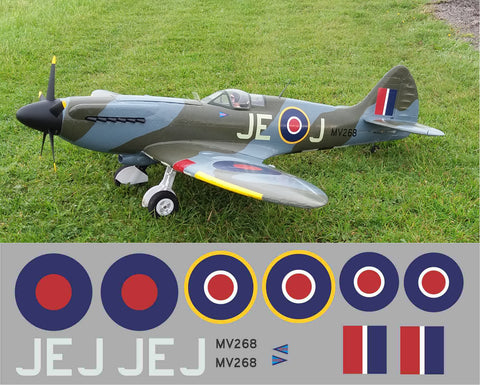Spitfire Mk XIVE MV268 JEJ flown by Grp Capt James Edgar 'Johnnie' Johnson, OC No 127 Wg, 2 TAF, May 1945
Air Vice Marshal James Edgar Johnson, CB, CBE, DSO & Two Bars, DFC & Bar (9 March 1915 – 30 January 2001), nicknamed "Johnnie", was a Royal Air Force (RAF) pilot and flying ace—defined as a pilot that has shot down five or more enemy aircraft in aerial combat—who flew and fought during the Second World War.
Johnson grew up and was educated in the East Midlands, where he qualified as an engineer. A sportsman, Johnson broke his collarbone while playing rugby, an injury that later complicated his ambitions of becoming a fighter pilot. Johnson had been interested in aviation since his youth and applied to join the RAF. He was initially rejected, first on social, and then on medical grounds; he was eventually accepted in August 1939. The injury problems, however, returned during his early training and flying career, resulting in him missing the Battle of France and the Battle of Britain between May and October 1940.
In 1940 Johnson had an operation to reset his collarbone, and began flying regularly. He took part in the offensive sweeps over German-occupied Europe from 1941 to 1944, almost without rest. Johnson was involved in heavy aerial fighting during this period. His combat tour included participation in the Dieppe Raid, Combined Bomber Offensive, Battle of Normandy, Operation Market Garden,the Battle of the Bulge and the Western Allied invasion of Germany. Johnson progressed to the rank of group captain by the end of the war.
Johnson was credited with 34 individual victories over enemy aircraft, as well as seven shared victories, three shared probable, 10 damaged, three shared damaged and one destroyed on the ground. Johnson flew 700 operational sorties and engaged enemy aircraft on 57 occasions. Included in his list of individual victories were 14 Messerschmitt Bf 109s and 20 Focke-Wulf Fw 190s destroyed making him the most successful RAF ace against the Fw 190. This score made him the highest scoring Western Allied fighter ace against the German Luftwaffe.
Johnson continued his career in the RAF after the war, and served in the Korean War before retiring in 1966 with the rank of air vice marshal. He maintained an interest in aviation and did public speaking on the subject as well as entering into the business of aviation art. Johnnie Johnson remained active until his death from cancer in 2001.
Photo by Geoffrey Robertson

